I frequently receive emails with guys asking me things such as:
“How many calories did you eat during your fat loss?”
“How many calories should I eat during my bulks?”
Unfortunately, I can’t answer that because I have never tracked my calories, and I only write about things I have done.
This is where my good friend Dejan Antic, a fitness blogger who writes at NoBrainer Muscle, comes into the picture. Dejan has made a great transformation himself, and he’s big on counting calories.
He will show you how to count calories in the most efficient way. Take it away, Dejan!
______________________________________________
 Calorie counting.
Calorie counting.
Used by few, dreaded by many.
Such a shame considering that calorie counting is one of the best tools you can use, to help you reach your fitness goals, in record time.
But here’s the thing.
You need to know how to count calories the right way, otherwise, you risk driving yourself nuts.
Well today, I’m going to show you how to count calories, the easy and effortless way, for guaranteed muscle gains.
So without further ado, let’s dive right in.
3 Reasons Why You Should Count Calories (Especially if You’re Skinny-Fat)
But before I tell you why counting calories is a great strategy to help you build lean muscle mass, I first need to address one of the main arguments of people who are against this whole shebang.
Most “enemies” of counting calories say that not all calories are created equal and that counting calories is stupid, since fat loss/muscle gains are more than just calories in and calories out.
To that I say … well, no shit.
Of course all calories are not created equal. There’s a big freaking difference between 500 calories you get in 100% organic, chicken breast compared to 500 calories you get in a Pop-Tart. The chicken breast has everything your body needs to develop and thrive, while the Pop-Tart has zero nutrients whatsoever.
So, you should always, put top priority, on eating as many healthy foods as possible, while limiting your intake of junk foods.
See calorie counting for what it really is—a tool you can use as a part of your nutritional strategy, which will help you gain priceless knowledge about your body.
That’s it … it’s not some kind of demon that’s eagerly waiting to suck the soul out of you.
And now with that out of the way, let me show you, why counting calories is great, and how it can help you gain more lean muscle mass, faster.
1. Helps you eat enough food for muscle growth
Most people are chronic undereaters, especially us skinny-fat guys.
Undereating is in my opinion the single biggest reason, why most guys never gain a single ounce of muscle mass, despite them working hard in the gym and eating only clean foods.
But if you ask your average skinny-fat guy this question:
“Do you think you’re eating enough foods to stimulate muscle growth?”
You’d probably get an answer like this:
“Of course I’m eating enough foods bro … I mean, I’m stuffing myself with nothing but chicken breasts and broccoli the whole damn day!”
But here’s a dirty little secret about clean foods, that nobody wants you to know about.
Most clean foods are not calorie dense—especially lean meats and vegetables. This means that clean foods are high in volume, but low in calories. That’s perfect if your goal is fat loss, but it’s not so great, if you’re trying to gain muscle mass.
So, even though you feel like you’ve eaten more than 2,000 calories worth of chicken breasts and broccoli, and that your stomach is about to explode, chances are, the total caloric value of the whole meal is less than 700 calories.
But if you take your average skinny-fat person’s diet under the microscope, you’ll quickly find out that they’re failing to meet their daily calorie goals big time. It’s not uncommon to underestimate your daily caloric intake by even a 1,000 calories, if you’re eating mostly clean foods and if you’re going by feel alone.
So why risk it?
Just track your calories in order to see, whether you’re done eating for the day or, if you need to squeeze in another meal to meet your daily numbers.
Undereating sucks and it’s a problem that’s easily fixable, if you track calories
2. Helps you develop the “food gazing” superpower
Wouldn’t it be cool if you could guess the calories and macronutrients on your plate, just by looking at it?
Well, that’s possible if you develop your “food gazing” superpower.
The fastest way for you to develop this superpower ability, is by tracking your calories for a couple of weeks. What you’ll notice is that, you’re able to accurately guess the calories and the macronutrient breakdown of your meal, just by looking at it.
This is because, most of the time, you’ll be logging the same types of foods every day, which means that you’ll know their nutritional value by heart.
The “food gazing” superpower especially comes in handy when weighing your foods with a kitchen scale is not an option (don’t want to look like a weirdo at a friend’s dinner party).
3. Trains your willpower muscles
At first counting calories will require some willpower, just like any other new habit.
But here’s the thing about willpower. Willpower is just like a muscle—the more you flex your willpower muscles (e.g. you log every food you eat for a couple of days), the more willpower strength you’ll have. And what’s even better is that the extra willpower strength, gained by counting calories, can be used in other areas of your life (e.g. studying, working, learning a new hobby, etc.).
How to Quickly Find Your Target Calories
Look, building muscle or losing fat is no rocket science.
If you want to gain muscle mass, train more, eat more calories than you consume and get plenty of sleep.
If you want to shred down on the other hand, lower your training volume a little, eat less calories than your body needs and get plenty of sleep.
So, if your main goal is to build lean muscle mass, then you need to eat more calories than you burn.
But now the question is … how do you know, how much is enough?
Well, the best thing you can do, is to start with a general calorie intake and then slowly adjust your numbers, based on the progress you see in the mirror.
Below is a simple formula, you can use to get your starting calories.
Target Calories Formula
For muscle mass: your body weight in pounds x 16 = your target calories
For fat loss: your body weight in pounds x 13 = your target calories
Note: In case you’re really fat—e.g. body fat percentage around 30%—deduct 20% of your weight from the equation since the excess body fat will skew your results.
As I said, start with a general number, and then slowly adjust your calories based on your progress. If for example, you see that at your current calorie intake, you’re not gaining any significant strength or size, bump up your calorie intake a little.
Figuring out your exact daily calorie requirements, will take some time and effort… but that’s time and effort well spent. Just be patient.
Tools of the Trade
Counting calories is easy, if you have the right tools for the job. With the right tools, you’ll spend less than five minutes every day, logging your foods.
Here are the tools you’re going to need in order to successfully count calories.
Digital Kitchen Scale
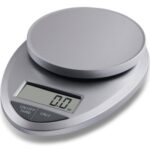 Say hello to your new best friend.
Say hello to your new best friend.
When you’re at your house, always weigh your foods prior to cooking. And don’t forget to note it down as soon as you’re done with the weighing the food, otherwise, you’ll forget (more about how to do this in just a second).
Any digital scale that’s precise to .05 ounce/1 gram increments will do. Here’s a digital scale that’s perfect for the job.
Free Calorie Calculator
I came across these apps a year ago, and today I can’t imagine my life without them.
These apps are a breeze to use, and I kid you not, it really takes me just a couple of seconds to log my meals. Just a few taps on your phone’s screen and boom, you’re done.
While there are thousands of free calorie tracking apps out there, I highly recommend the following two:
MyFitnessPal is by far the best calorie tracker app on the internet. It has a ton of different foods in it’s database and it also allows you to input your own custom foods.
The best thing about this calorie tracker is that it’s free and it’s also available for you to download on many different devices.
The interface of the app is very intuitive to use, so I believe you won’t have any problems getting the hang of it.
LoseIt! just looks plain beautiful.
You can see that a lot of effort went into developing this app and it shows—works like gangbusters.
This app would’ve been my number one choice if only there was a possibility to use the metric system. While for most of you guys who live in the US this ain’t a problem, for us, non-US guys, this can be a bit of a pain.
Just like MyFitnessPal, LoseIt! is also completely free to use, so definitely play with both calorie tracker apps and see which one you like the most.
But I don’t have a smartphone … how should I do this?
No smartphone, no problem.
Both calorie tracking services offer a web version of their mobile apps, completely free, which means that you can also log your meals from your web browser.
Just take notes about the meals that you’ve eaten throughout the day, in your notebook or something, and at the end of the day, input your data into their website.
This won’t take you more than five minutes each day.
How to Count Calories Like a Boss
Now it’s time to put everything into practice.
Let’s take me as an example.
Most of the days, I eat just two meals—lunch and dinner (intermittent fasting style basically). But recently,I also started to eat breakfast, since I’m trying to gain muscle mass.
Let me show you how I do it.
Breakfast
This is my first meal of the day.
Like I said, I don’t usually eat breakfast, but recently I’ve been working on gaining muscle mass, so two meals are not enough for me.
Anyway, I always eat my breakfast at home, and that’s great for two reasons:
- You have complete control over what kind of foods you eat.
- You’re able to weigh your foods.
I tend to eat the same meals every day.
Now, I know you’re probably thinking:
“But Dejan, don’t you get tired of eating the same meals every day?”
Well, the simple answer is, no.
Eating the same meals every day, helps me simplify my life, by minimizing the time I spend in the kitchen and the time I spend thinking about food.
My go-to morning meal is a big salad combo, which consists of the following:

- mixed salad,
- 150 grams of canned tuna,
- 100 grams of full-fat cottage cheese,
- 240 grams of canned beans,
- 50 grams of olive oil and some balsamic vinegar.
The meal prep time is less than three minutes, it tastes freaking delicious and it’s jam-packed with nutritious calories. Breakfast of champions.
But before I take my first bite, I always log the meal that I’m about to eat.
The MyFitnessPal app also allows you to save a meal template, so it’s even easier to track everything.
Lunch
After breakfast, it’s time to head out to work.
I eat my lunch at the employee’s cafeteria around noon. Now this is a tricky situation, because:
- I don’t have control over the foods that are offered,
- I can’t weigh the foods that I’m about to eat,
- It’s hard to guess the nutritional values of some foods.
All of the problems above could be easily solved, if I brought my own foods with me to work. But I tend not to do that since, hey, who can say no to a free meal :) And besides, there are always good protein and carb sources for me to choose.
Anyway, I tend to get the most out of every situation, so this is how I approach this scenario:
- I always choose foods that I’m familiar with (e.g. white rice as a carb source, lean proteins as a protein source).
- I do my best to guesstimate the weight of the foods (don’t obsess over getting the weight of the foods down to a single gram … just do your best and live your life stress free).
With the meal in front of me, it’s time to log in the calories.
Dinner
Dinner is usually my post-workout meal, since I tend to work out, once I get back home from work. That’s why my dinner is the heftiest meal of the day, and it’s made out of a ton of carbohydrates in order to replenish my glycogen stores, and a lot of proteins to stimulate muscle growth.
For my dinner/post-workout meal, I usually eat the following:
- 400 grams of lean meats,
- 400 grams of white rice.

And just like with breakfast, logging my dinner meal takes me less than three minutes, since I already have this meal saved as a template. Each screen is a separate step (click for a bigger picture).
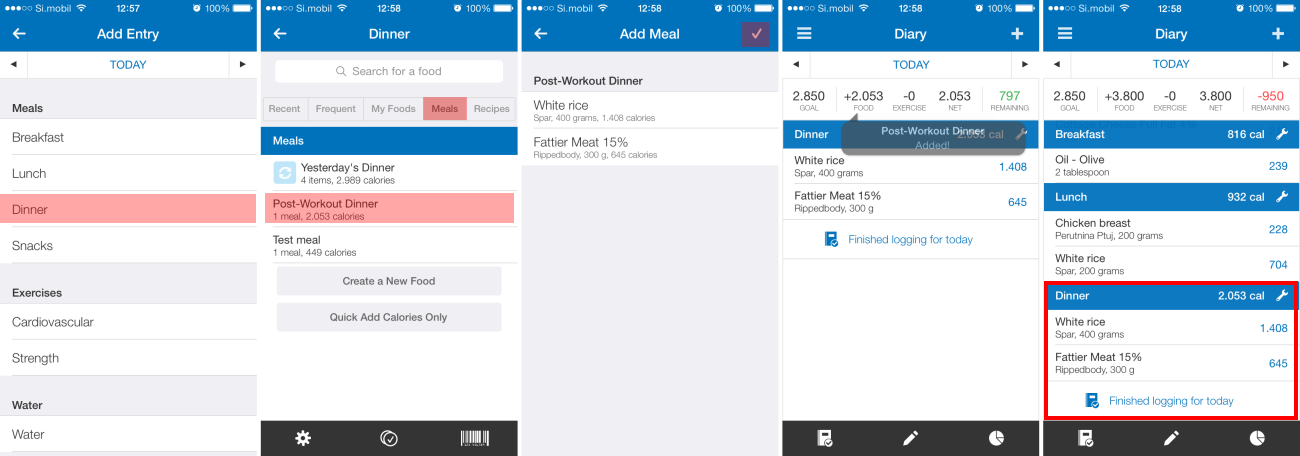
So, once I’m done with my dinner, I can call it a day. Below you can see my total calories and my macros in a really nice looking pie chart.
Trust me, the habit of counting calories will help you tremendously. It builds willpower and it’ll help you shed some light on how your body works and how it responds to certain types of foods.
This kind of information my friend, is priceless.
Tips and Tricks For Counting Calories
Below, I’ve compiled some of the most frequently asked questions and answers/comments/tips, about counting calories.
It’s better to input something than nothing
Just because you can’t weigh a certain food, doesn’t mean that you shouldn’t log it in your calorie tracker.
When you don’t have access to your kitchen scale, do your best to make an educated guess on how much a food that you’ve just eaten, weighs.
It’s really important, especially when you’re first starting out, to log everything that you eat, because you want to develop the habit of calorie counting as fast as possible.
Don’t let it become an obsession
A lot of beginners tend to get consumed by this whole calorie counting thing. They get so caught up in this, that they get overly obsessive about every single calorie.
Look, if you’re starting to lose sleep because you fell 100 calories short on your daily calorie goal, then you’re doing this the wrong way.
Just take the data you get from your calorie trackers for what it really is—knowledge about yourself. By logging your calories, you’ll be quickly able to see how certain foods affect your performance in the gym and your overall wellbeing.
How should I weigh my foods, raw or cooked?
Always weigh your foods raw.
Eat the same foods every day
By eating the same healthy foods every day, you’ll greatly decrease the time it takes for you to log everything. And as an added bonus, you’ll have more time to spend on things you love doing instead of being a slave to the kitchen.
What about energy expenditure, do I need to track that also?
Nope.
Most calorie counters give you an option to also log your energy expenditure, by listing the activities that you did throughout the day. My advice is don’t bother with tracking your energy expenditure/activities since it’s highly inaccurate and there’s also no real need for you to keep tabs on that.
Remember, less is more.
Your Turn…
Phew, you’ve reached the end of this long and detailed article, congratulations.
I seriously believe that calorie counting is a great addition to your existing nutritional approach. Try it out and see how it works for you.
Here’s what I want you to do now …
- Define what your goal is (building muscle, shred down or maintenance).
- Calculate the amount of calories you need to achieve your goal (click here for a refresher).
- Go buy yourself a kitchen scale, if you don’t have one.
- Install a calorie tracking app of your choice on your smartphone (I recommend MyFitnessPal).
- Start tracking calories and watch your muscles grow.
That’s it.
This is a pretty extensive resource so in case you have any questions—like how to find out the right ratio of proteins, carbs and fats—or experiences you’d like to share, feel free to comment in the comments section below.
To your success!
About the author: You can learn more about Dejan’s no-nonsense training methods at NoBrainerMuscle.com and be sure to check out his Free 12-Part Muscle Building Course for Hardgainers.
Image credit: Powerplantop

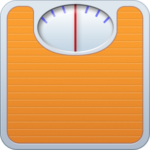

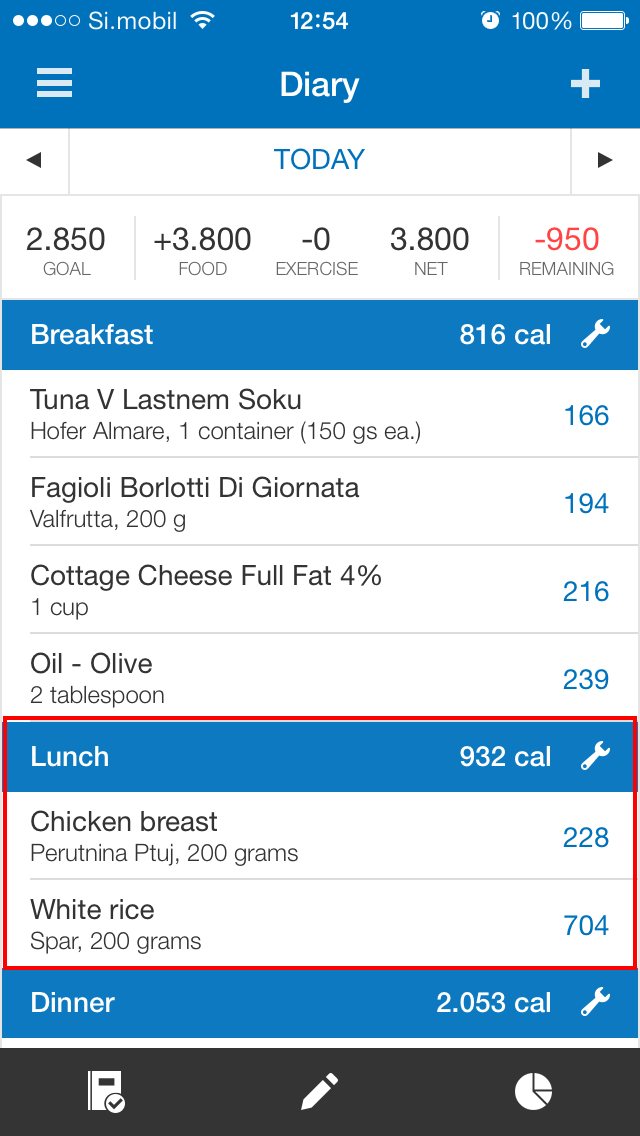

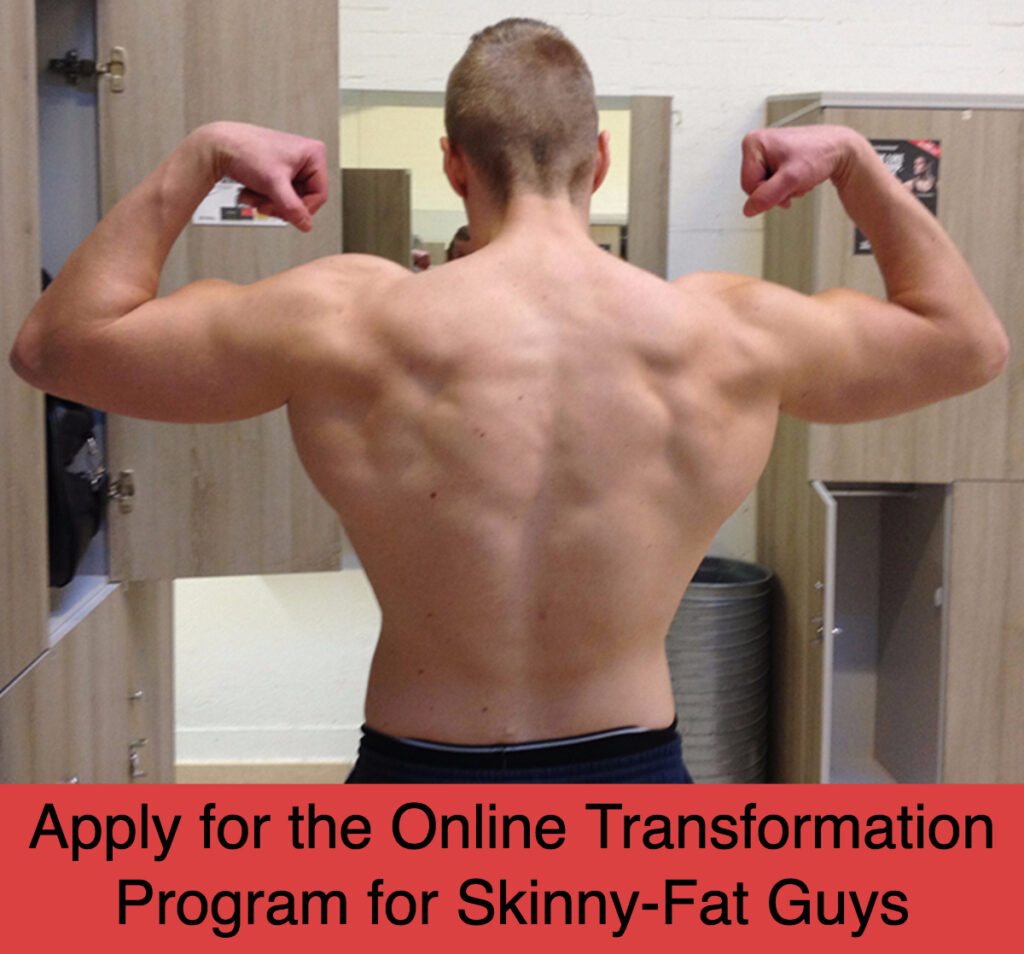
 How to Learn Handstand Push Ups in 6 steps (and a routine)
How to Learn Handstand Push Ups in 6 steps (and a routine)
Great article.
This is the most common mistake that beginners make, not counting the calories. if you do not count your calories, at the end you have no idea where you’re going and where you stand.
Hello oskar , should i choose 0.25/0.5/0.75 or 1kg per week on the fit app ?
I’m very confused about what to eat (and how much) with my skinny fat built. So far I eat mostly veggies and meat, with very low amount of carbs. All of this reading at a deficit to my TDEE. Is this the correct way of diet?
Is your goal fat loss or muscle gain?
Short term goal is to lower fat. I am really not happy with this belly. Long term I want to gain muscle and get a more defined body.
This is one of the most difficult subjects to try and explain it to someone. The only way to learn how to do this is by doing it yourself.
By the way, I finished my 30 day eating challenge a couple of days ago. I lost 5 pounds eating McDonald’s every day.
Counting calories works.
You’re absolutely right Sebastian! At the end of the day, the only way to learn stuff is to do it yourself.
Hopefully this article will inspire people, to give calorie counting a go, since I believe, it’s an invaluable tool to have for every aspiring physique architect.
And I love your challenge bro! I think you’ve just proved that your belief about food also plays a key role into determining how the calories will be partitioned. If you think that that delicious Big Mac is bad for you, chances are more of those calories will be stored as fat, but on the other hand, if you believe that that delicious Big Mac will help you build muscle mass, then I believe that those calories will help you do just that (strength training is a must, I must say).
I know this might sound like new-age, woo woo bro-science, but I’m starting to believe that the mindset you’re in when you’re consuming food also plays a big role in calorie partitioning.
How much McDonalds did you eat everyday Sebastian, and did it affect your gym performance negatively?
I also noticed that whenever I increased my intake of junk foods, while still keeping my protein intake untouched, my gym performance got better. It’s probably due to the increased amount of total calories consumed.
Same here. As long as I train hard and often, I can eat quite a lot of junk and still stay lean while having great workouts.
I always try to do at least 1 more rep, so yea, I was able to increase strength by that amount.
It took me 1 week to get used to it, due to the whole mental barrier of thinking, “shit, mcdonalds can’t be good for you” but after a while I got used to it and started looking forward to it.
Losing the 5lbs really proved me to that, well, numbers are numbers.
I’m done with the challenge, but I am no longer afraid of food.
I’ve been having chocolate every day.
But how Dejan said, my daily macronutrient numbers remained untouched.
And I had one hamburger per day.
Each hamburger had like half my fat intake for the day so I couldn’t have more than one without it screwing my fat intake for the day.
Some days I did have 2 hamburgers, or a hamburger and ice cream, or something like that and those days are tricky.
I have to eat egg whites and/or whey protein, and fruit, to avoid eating too much fat.
YOU SOLD YOU OSKARD
I “sold out” because I included a guest post that explains how to count calories (a question that MANY people keep asking me about, which I cannot answer since I don’t do it)?
I have never said that my way is the only way to do things.
Just because I don’t count calories, doesn’t mean that other people cannot benefit from it.
I admire your progress and do your routine.of bodyweight.I hope have been wrong with you and with Dejan in this last post.Your friend tell about suplemens for hardgainers,remember,if isn´t grown in the ground,fallen from a tree or made from a animal it IS NOT FOOD.if the ingredient have more of 2 ingredients IS NOT FOOD.if you are skinny eat eat eat always balanced.ok oskard thans for all.I will follow you:b
Thanks Daniel, I hope the routine works out for you.
I just took a look at Dejan’s supplement post, and I can see that he has a similar stance regarding supplements as I do:
“People are always looking for that magic supplement that will let them put on slabs of muscle without needing to train with intensity or have a proper diet.
Sorry to burst your bubble folks, but there is no such thing as magic supplements for muscle gain.” (this is taken from the intro of his supplement article)
Supplements can serve a purpose (I take 4 supplements now to cover deficiencies from my nutrition), but they aren’t necessary. Food should be 1st priority.
Nice one Oskar!
People tend to get lost in minutiae, like supplements, when what they need to focus on actually is their training and nutrition.
Very interesting read. Certainly v helpful for anybody wanting to look into calorie counting seriously. Just one point, however, I have read (and been told) that foods should be weighed after they have been cooked, esp rice, pasta, potatos etc. Could you elaborate a little further on this, please?
This would depend on whether or not it is specified on the packaging, sometimes rice will say 1/4c or Xgrams uncooked, or it might also say “as prepared”.
Thanks. On the packaging of my rice & pasta it has:
Pasta: Nutrition facts: 100g of dry pasta contains..
Rice: Typical values (as consumed) per 100g..
Presumably, this would indicate that weighing the pasta pre-cook is correct and weighing the rice post-cook is correct, in order to calorie count properly?
Hey Dean,
I usually weigh all of my foods pre-cooked, because I find that easier to do. But you can also weigh your foods after you cook them if you really want to, no problem with that nor is it a big difference actually :)
Thanks for your reply, Dejan.
I thought as much, but wanted to ‘test’ it out slightly. I’ve bee weighing my food pre/post all day. It seems there are some slight differences, but nothing major. However, with pasta there is quite the change. For example, I weighed out 70g pasta (uncooked) and then weighed the same amount (cooked) and the weight difference was fairly significant at around 134g, almost double. Of course, it is to be expected that the pasta would absorb the water, thus increasing the weight. Nonetheless, rather interesting. With such a big difference, then there must be a certain way this should be done. I think weighing pre cook may be the ‘true’ representation of the amount.
You’re welcome Dean :)
Yeah, some foods tend to gain a lot of weight after cooking due to water absorption. That’s why I recommend that you weigh all of your foods prior to cooking them, because it’s so much easier. You can weigh all of your foods after cooking, but I believe that to be a waste of my time and energy.
Great post,
I’ve been calorie counting for this past week and it has really helped stave off my constant cravings for huge quantities of food. Since I don’t have to think whether I’m more hungry or not, because I’m only eating what I planned, I save that decision making and I don’t crave more food. I’m doing 30C/40F/30P for slow fat loss with daily kettlebell or bodyweight workouts.
Thanks for the content!
– Nicklas
You’re welcome Nicklas!
You know what they say … you can’t manage what you don’t measure :)
First guest post, Oskar?!
Cool initiative.
———————————
Wow Dejan,
I used to track and count calories –hardcore–when I first started working out seriously almost 3 years ago. I don’t do it anymore, I now got what you refer to as “calorie-counting superpowers”. So it happens almost automatically.
“Most people are chronic undereaters”
— I’m not sure I agree with that. But I definitely think that most people eat too frequently, and not enough. They’re just raising their insulin levels for nothing, making them fat.
Epic post.
Thanks Ludvig!
A lot of smart people, like you, start to track calories when they first start to work out and what they usually find out is that after a couple of weeks go by, they don’t need to track them anymore, since they’ve developed the “food gazing” superpower.
In my experience with coaching people, I found that a lot of people tend to undereat, especially when they clean up their diets. Once they ask me why they haven’t been able to gain any size or strength, a quick glance over their average calorie intake usually gives me the answer.
I can see how tracking calories can work (especially for a beginner), but at the same time, I don’t want to do it because I feel like it takes away the pleasure from eating. One of my favorite things to do is to eat a huge meal after a long workout without worrying about calories.
With that said, I never counted calories, but I started looking at labels of food when I started training and I mostly eat the same foods, so I have a good idea of the amount of calories I eat.
People need to realize that counting calories is a means to an end. It’s important to track them at the beginning in order to get to know your foods better, but once you do it for some time, you won’t have to track every single calorie anymore, since you’ll get a pretty accurate idea of how much food you’ve eaten throuoght the day just by feel alone.
That’s the superpower I mentioned in the article.